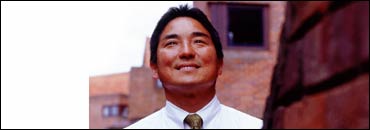 |
|||||
|
Words
of wisdom
from an
Apple evangelist Guy Kawasaki is fun to listen to. As he took the podium last Thursday at the Sacramento Grand Ballroom, it took him only a few seconds to grab the crowd. "How many Microsoft people does it take take to screw in a light bulb?" asked the boyish-looking 44-year old. "None. Bill Gates has declared darkness the new standard." (Big laugh). He switched gears to his opinion of high-tech speakers. "Frankly," he said, as he deadpanned the audience, "Most of them suck." (Another big laugh.) Unlike any of them, he vowed to entertain. He did. Kawasaki is the marketing whiz-kid who evangelized the superiority of Apple's Macintosh computers in the 1980s and part of the '90s. If you look at today's zealot-like tribe of Apple followers, you get the feeling Kawasaki knows how to push buttons. He spoke last week to a gathering of students and mentors of the Sacramento Entrepreneurship Academy, passing along start-up how-to tips with his brand of cocksure, friendly humor. Kawasaki, who also was signing copies of his book "Rules for Revolutionaries," told of his membership in the inner circle at Apple with Steve Jobs and a close-knit group of techies in the early '80s. "We were arrogant, we were egomaniacal," he said. Orange juice was always available to these ambitious young world-beaters, as was massage therapy. They worked long hours with brokendown office furniture, but they went first class for all flights over two hours. They had two goals in building their revolutionary computer: They wanted it to help people increase their creativity and productivity -- that was No. 1. And No. 2 was to "send IBM back to the typewriter business holding its Selectric balls." Well, a .500 batting average isn't so bad. A couple of years ago, Kawasaki left Apple to start his own Web site, garage.com, to help start-up tech companies find small packets of seed money. He joked that after he left Apple, it suddenly became profitable. But he credits that to Jobs' return as company leader, and to the hotcake sales of iMacs, Apple's long-awaited runaway success. A circuit speaker, Kawasaki's big message is that creative, logical thinking oft times will hack the rebel entrepreneur's unconventional path to success. Some of his advice: - "Get off the curve you're on and get to the next curve." Figure out how to innovate a product or service. Kawasaki points to Federal Express, and how it changed the shipping business. "The idea for FedEx got a C at Yale," he said. - "Don't worry, be crappy." The first Macintosh cost $2,500, had 128 kilobytes of memory, had no color monitor, no hard disk and no software. So what? That "revolutionary piece of crap," as Kawasaki called it, followed the Apple mantra of "first you ship, then you test," to start honing and improving the product. - "Churn, baby, churn." Improving products is crucial, and Microsoft is better in this department than Apple, he said. But as far as revolutionary progress goes, he added, "Two things count: where you started and how fast you're moving. A revolution is a process, not an event." - "Break down barriers." Kawasaki praised BMW and Clairol for offering Web sites that further explain their products. He praised Nike for its women's athletic shoe ads. They sell shoes made of cotton, leather and rubber by promoting them as symbols of power and efficiency for women. That's called "positioning the product as a cause," Kawasaki said. Which is what he did with Macs. - "Eat like a bird, poop like an elephant." Some birds eat more than half their weight in food per day. Ergo, to wise up about what the market wants, "read voraciously." And common sense helps. A Lockheed designer asked fighter pilots returning from missions what they wanted on their airplanes. He then successfully incorporated those features into Lockheed jets. That, "instead of waiting for a Pentagon report," on desired features. And once this gathered information is translated into a product, he said, like elephant poop, it should be widely spread around. Apple made a mistake when it didn't license its Mac operating system to other manufacturers, Kawasaki said. Most in the industry agree. - "Think digital, act analog." In a nutshell, this means use the power of technology to provide human touches in your products or services. Ritz Carlton hotels use technology to record guests' personal preferences, so a hotel can provide guests such things as their favorite type of pillow. - "Never ask people to do something you yourself would not do." That is, don't expect people will wait on hold for a halfhour to get service. Kawasaki predicted personal computers won't go away for some time because they're costing less and less. People like Michael Rogers think PCs will be overtaken in the next "curve" by smart phones. Rogers, of Sacramento's Veratouch Technology Inc., is developing technology to make phones work like computers through a specially equipped TV. But Kawasaki isn't convinced. "I get about 150 e-mails a day," he said. "I'm not going to use a smart phone for that." He pulled his laptop computer out of his backpack and put his wireless phone on top of it. "Is it going to get smaller than that?" But Kawasaki admitted it's a tough call to correctly predict technology's path. "It's very hard to see the future revolutions," he said, "when you're in the middle of one."
---- |
||||
